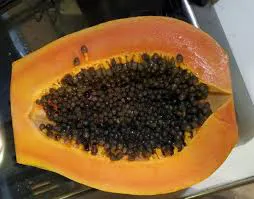 The seeds of papaya fruits are usually left unused by the industry, but they have been previously reported to be anthelmintic. However, the effects and mechanisms involved in papaya seeds against root-knot nematodes (RKN) are poorly studied in soil incorporation.
The seeds of papaya fruits are usually left unused by the industry, but they have been previously reported to be anthelmintic. However, the effects and mechanisms involved in papaya seeds against root-knot nematodes (RKN) are poorly studied in soil incorporation.
Scientists at Universidade Federal de Lavras (Brazil) have investigated soil biofumigation with papaya seeds against the RKN Meloidogyne incognita and the effect of their volatile organic compounds (VOCs) separately from non-VOCs.
"Soil biofumigation reduced the number of galls and eggs of RKN about 100% in tomato roots, by using seeds macerates at 4.0 g/100 mL, which is a feasible amount for field applications - The scientists explain - Furthermore, the VOCs emitted by the seeds killed 80% of M. incognita second-stage juveniles after a few hours of exposure".
The scientists have identified the volatile compounds of the papaya seed by gas chromatography and studied their effect against RKN. "We examined the efficacy of all non-studied compounds against M. incognita. The most promising compounds resulted vinyl acetate, phenylacetaldehyde and benzylacetonitrile with lethal concentrations (LC50) of 61.5, 101.3 and 14.4 µg/mL, respectively," underline the scientists.
When vinyl acetate and phenylacetaldehyde were applied to the soil at the recommended commercial nematicide dose (396 µg/mL), the effect on M. incognita was better than the commercial nematicide (Carbofuran), reducing 70% of the number of galls and eggs. While, benzylacetonitrile reduced galls and eggs only by 25%. The scientists conclude that these results provide evidence for biofumigation with papaya seeds as a sustainable approach to control RKN and the potential use of their VOCs as nematicidal compounds.
Source: Vanessa Alves Gomes, Vicente P. Campos, Julio Carlos Pereira da Silva, Fabíola de Jesus Silva, Marcela de Freitas Silva, Marcio Pozzobon Pedroso, 'Activity of papaya seeds (Carica papaya) against Meloidogyne incognita as a soil biofumigant', 2020, Journal of Pest Science
